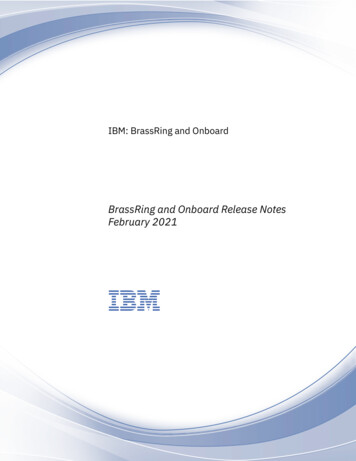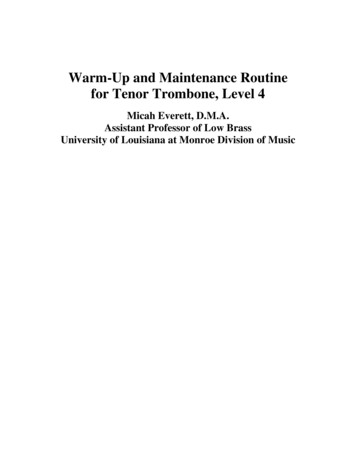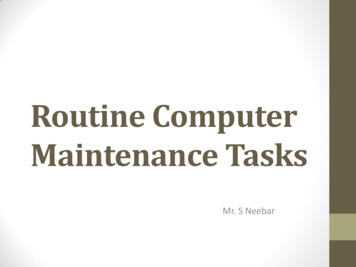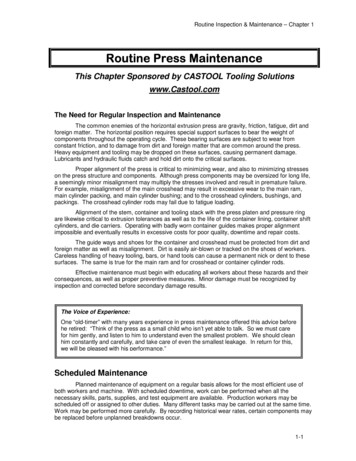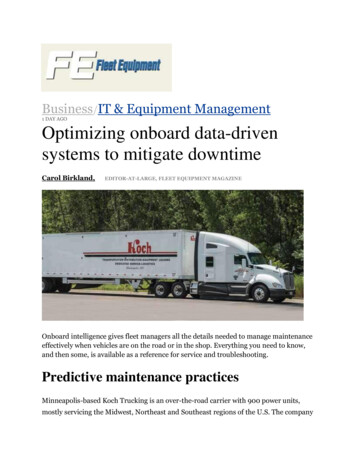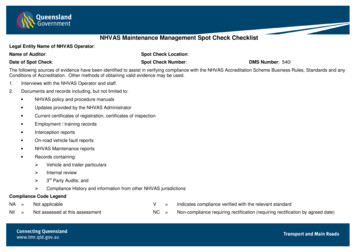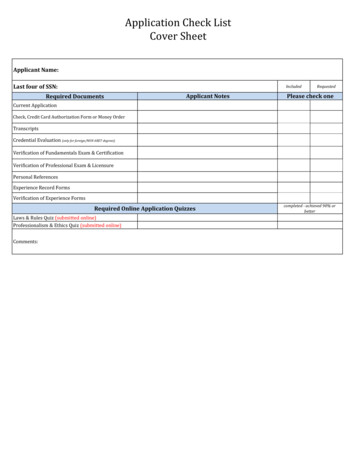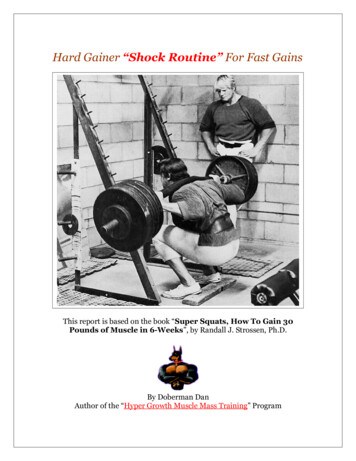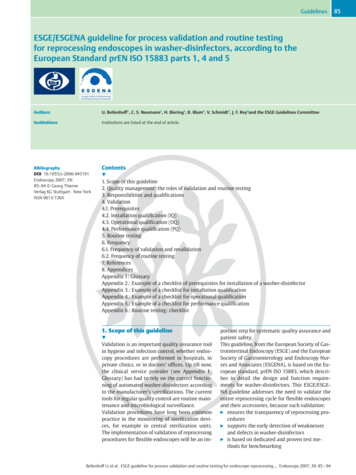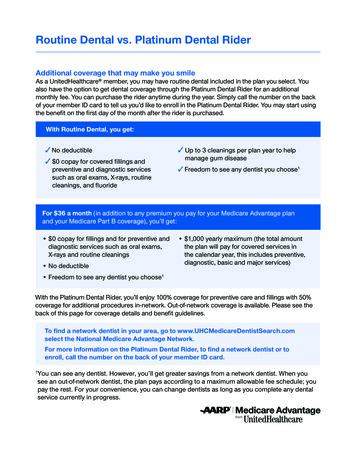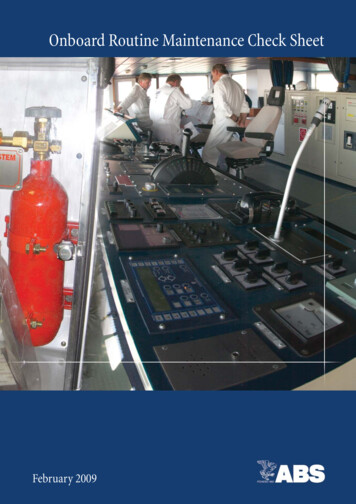
Transcription
Onboard Routine Maintenance Check SheetFebruary 2009
Our MissionThe mission of ABS is to serve the public interest as well as theneeds of our clients by promoting the security of life, propertyand the natural environment primarily through the developmentand verification of standards for the design, construction andoperational maintenance of marine-related facilities.Quality & Environmental PolicyIt is the policy of the American Bureau of Shipping to beresponsive to the individual and collective needs of our clientsas well as those of the public at large, to provide quality servicesin support of our mission, and to provide our services consistentwith international standards developed to avoid, reduce orcontrol pollution to theenvironment.All of our client commitments, supporting actions, and servicesdelivered must be recognized as expressions of Quality. Wepledge to monitor our performance as an on-going activity andto strive for continuous improvement.We commit to operate consistent with applicable environmentallegislation and regulations and to provide a framework forestablishing and reviewing environmental objectives andtargets.
ONBOARD ROUTINE MAINTENANCECHECK SHEETFEBRUARY 2009American Bureau of ShippingIncorporated by Act of Legislature ofthe State of New York 1862Copyright 2009American Bureau of ShippingABS Plaza16855 Northchase DriveHouston, TX 77060 USA
DisclaimerUse of this check sheet is neither a classification nor a statutory requirement. This check sheet is provided to owners to use in drafting andrefining their own operation and maintenance procedures. This check sheet has not been developed for any particular ship or type of ship.As it is based on observations during surveys, inspections and audits, the checklist may include items which do not apply to a particular shipand may omit items which do apply.Limitation of LiabilityIf any party using this check sheet relies on any information or advice given by ABS, and suffers loss, damage or expense directly therebywhich is proven to have been caused by the negligent act, omission or error of ABS, its officers, employees or agents, or from breach of anyimplied or express warranty of workmanlike performance in connection with the services, or from any other reason, then the combinedliability of ABS, its officers, employees, agents or subcontractors to the client or any other person, corporation, partnership, business entity,sovereign, country or nation, will be limited to the greater of a) 10,000 or b) an amount equal to ten times the sum actually paid for theservices alleged to be deficient.ABS shall in no circumstances be liable for indirect or consequential loss or damage (including, but without limitation, loss of profit, loss ofcontract, loss of use) suffered by any person resulting from any failure by ABS in the performance of its obligations in preparing this checksheet. Under no circumstances whatsoever shall any individual who many have personally caused the loss, damage or expense be heldpersonally liable.Nothing in this check sheet shall be deemed to create any interest, right, claim or benefit in any insurer or other third party who has notreceived this check sheet directly from ABS. It is understood and agreed that nothing expressed herein is intended or shall be construed togive any other person, firm or corporation, any right, remedy or claim hereunder.iiFebruary 2009 ABS Vessel Routine Maintenance Including Check Sheet
INTRODUCTIONABS is committed to promoting the security of life at sea, of property and of the natural environment. It believesthat an important element in achieving these goals is a well designed and effectively implemented ship maintenance system. A sound maintenance program not only helps address safety, environmental and operationalconcerns, but it is a sensible investment in a valuable asset, the ship. With this in mind, the information suppliedin the attached check sheet is intended to assist our clients in fulfilling their commitments to their crews, shipsand the general public.The attached check sheet has been developed as an aid for crewmembers to use when carrying out normalroutine maintenance for their ship. Completion of the check sheet is not a requirement of class, nor requiredby any flag or port State authority. It is merely a tool that may be used by the crew as reference for items thatmay be overlooked during routine maintenance.If any item on the check sheet is not in satisfactory condition, then the crew should take appropriate steps toremedy the condition. However, if the condition is detected while the vessel is on passage and it cannot berectified prior to entering port, we suggest to our clients that they notify their owner, ABS, their flag State,and the port State of the ship’s next port of call; request attendance by ABS; and make a notation in the ship’slogbook of any action taken.Additionally, our clients should be aware that Port State Control empowers a State to verify the condition andacceptability of a foreign vessel using its ports. A port State inspection can identify sub-standard items orprocedures on the ship and the inspector may detain the ship until the specified defects are rectified.ABS Vessel Routine Maintenance Including Check Sheet February 2009iii
SYNOPSIS OF FINDINGS FROMROUTINE SURVEYS, INSPECTIONS AND AUDITSStatutory Certificates, Overdue SurveysSurveyors, auditors and inspectors routinely review a vessel’s documentation (certificates) to verify that theyhave been endorsed for all required surveys during the intervals mandated by the various conventions or classrequirements. Surveys must be completed within the required survey interval for the statutory documents toremain current.Cargo Ship Safety Radio SurveysCommon findings recorded in this category relate to main radiotelegraph transmission and reception equipment.In some cases, the power output of transmitters has been found to be below an acceptable level, causing a reduction in the range of transmissions. Faults observed in receiving equipment include unsatisfactory reception.Typical examples of other findings in this category are deteriorated aerials; broken aerial insulators; improperlyrigged aerials for very high frequency equipment; inoperable automatic alarms; defective speakers; and faultyemergency power sources.Cargo Ship Safety Equipment Surveys1. Lifesaving AppliancesProperly functioning lifesaving appliances are key elements of ship safety. Routine crew examinationsand proper maintenance can identify or remedy potential problems, such as structural defects in lifeboats,inoperative lifeboat engines or flemming gear, missing or inoperative lights on lifebuoys and lifejackets,excessively worn lifting hooks in lifeboats, missing retro-reflective tape from equipment, badly corrodedengine mounts in lifeboats, missing safety equipment from lifeboats, unsatisfactory “float-free” arrangement on liferafts and inoperative lifeboat launching systems.2. Firefighting EquipmentIt is of utmost importance that the firefighting equipment be properly examined, maintained and readyfor immediate use at all times. Unfortunately, there are many firefighting findings (related to the detection, extinction or risk of fire) observed during surveys and audits including: missing or holed fire hoses;missing fire hose nozzles; defective breathing apparatus; excessive oil accumulation in machinery spacesbilges; broken fire detectors; missing, poorly maintained or uncharged fire extinguishers; holed or softpatched fire mains; missing or broken fire station cabinet handles and hinges, wrenches and hydranthandwheels; unmarked, broken or inoperative fire dampers; unprepared fire and emergency crews;valves and fittings related to IGS in disrepair; CO2 cylinder room being used for storage; paints storedin machinery spaces instead of in a dedicated paint locker; heavy accumulation of grease in galleyexhaust ventilation trunking; seized machinery space skylights; frozen or holed funnel dampers; andengine room ventilators.3. Navigation EquipmentDuring surveys and audits, the types of findings include out-of-date, uncorrected or missing charts forthe intended voyages; inaccurately calibrated magnetic compasses; faulty radio direction finders, echodepth sounders, radar’s, gyro repeaters, and navigation lights; outdated Tide Tables, List of Lights andSailing Directions, etc.; and copies of regulations (e.g., SOLAS, MARPOL, ITU etc.) not on board.ABS Vessel Routine Maintenance Including Check Sheet February 2009v
Cargo Ship Safety Construction SurveysThe following findings deal mainly with steering gear and mooring arrangement requirements. Other findings,which relate to structural items, are discussed under class surveys, hull (below): steering control system malfunctioning; officers not knowledgeable about emergency steering procedures; communications in emergency steeringroom not working; anchor chains, windlasses, wire ropes and mooring lines in a deteriorated physical conditionand potentially dangerous; defective guards on winches and windlasses; and missing anchors and chain.Housekeeping and Fire Safety, Documentation, Manning, Accommodations1. ManningThe STCW Convention requires that ships have properly trained and qualified crews. These elements ofmanning are important because the safety of a ship, its crew, its passengers and cargo and the protectionof the marine environment depend to a large extent on the training, experience and competence of thecrew. The majority of findings in this category relate to the minimum international standards for certificates issued under the STCW Convention. Each flag State is responsible for establishing the appropriatelevels of the manning aboard ships under its jurisdiction and for issuing each ship with a safety-manningcertificate. Findings in each category include navigational watches stood by uncertified officers, incorrectly endorsed officers’ certificates for the ship they are serving aboard (e.g. oil tankers, gas carriers andchemical tankers), key officers not in attendence and manning exceeding the numbers listed on theCargo Ship Safety Equipment Certificate.2. DocumentationStatutory certificates are issued to ships in accordance with the various international conventions.Surveyors, auditors and inspectors have found findings related to a vessel’s certificates including expiredcertificates, overdue annual or intermediate surveys, and improperly issued or missing certificates aftera vessel has changed flag from one State to another.3. Accommodations, Provisions and Working SpacesExamples of findings pertaining to the crew accommodations include: infestation by cockroaches; blockeddrains; dirty hospitals and bathrooms; leaking toilet piping; missing shower nozzles and controls; brokenor inoperable sinks and toilets; crew members living in hospital spaces; doors to accommodations notclosing adequately; and broken light fixtures and switches. As far as provisions are concerned, the findings usually relate to poor standards of cleanliness. Other findings included in this category are deteriorated insulation in galleys that poses a potential health hazard; ineffective or inoperative refrigerationmachinery for cooling storerooms; and insufficient food for the intended voyage. Finally, as far as workingspaces are concerned, findings include lack of adequate lighting and ventilation as well as defective ormissing guards to protect the operator from the moving parts of machinery.MARPOL SurveysCareful attention should be paid to pollution prevention measures on board as well as maintaining accuraterecords for the handling of oil and other pollutants. Penalties can be severe for an owner and any responsiblecrewmembers if a vessel fails to comply with the regulations. Findings noted during surveys and audits include:missing oil record keeping book or entries not up to date; poorly maintained, misoperating or inoperative equipment for separating oil from water including oil-content monitoring devices; sludge tank connected directlyoverboard; and missing or unposted pollution placard.viFebruary 2009 ABS Vessel Routine Maintenance Including Check Sheet
Load Line SurveysSurveyors have recorded findings where ventilators, air pipes, watertight doors and hatchways had deterioratedsufficiently to warrant repairs. These findings could have been avoided by adequate maintenance performed priorto surveyor attendance. Other findings in this category include: cargo hatch cover securing devices missing orinoperable; sounding pipe caps missing; air pipes holed; securing devices on weathertight and watertight doorsmissing; holed cargo hatch covers; non-sealing weathertight doors; corroded manhole covers; and unsafe rails atthe side of the ship. Other findings associated with the Load Line Convention are discussed under classificationsurveys, hull (below).Classification Surveys1. HullThe findings include damage and deterioration of the hull, including items such as distorted bulbousbow plating and side shell plating deformations; damaged gangways, accommodation ladders, exposedwalkways/platforms, and pilot ladders; corroded cable trays and trunks; faulty closing appliances; seriously wasted, holed, cracked or fractured side frames, transverse deck beams, deck plating, and watertightbulkheads in the chain locker, forecastle storage space, and engine room; holed vent pipes/closure heads;holed or damaged hatches; weathertight doors not sealing; overdue special hull surveys; and corrodedaccess ladders to cargo holds or tanks.2. MachinerySurveys that have identified poorly maintained engine rooms list findings such as excessive oil in bilgesand throughout the engine room. Other findings in this category include inoperable remote controls onboiler safety valves; defective fuel-oil valves on main and auxiliary engines; improperly adjusted steeringgear; accumulation of water leaking on auxiliary engines; frozen or in
ABS Vessel Routine Maintenance Including Check Sheet † February 2009 vii Load Line Surveys Surveyors have recorded findings where ventilators, air pipes, watertight doors and hatchways had deteriorated sufficiently to warrant repairs. These findings could have been avoided by adequate maintenance performed prior to surveyor attendance. Other findings in this category include: cargo File Size: 580KBPage Count: 34
